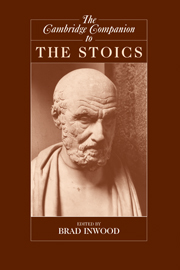Book contents
- Frontmatter
- Introduction
- 1 The School, from Zeno to Arius Didymus
- 2 The School in the Roman Imperial Period
- 3 Stoic Epistemology
- 4 Logic
- 5 Stoic Natural Philosophy (Physics and Cosmology)
- 6 Stoic Theology
- 7 Stoic Determinism
- 8 Stoic Metaphysics
- 9 Stoic Ethics
- 10 Stoic Moral Psychology
- 11 Stoicism and Medicine
- 12 The Stoic Contribution to Traditional Grammar
- 13 The Stoics and the Astronomical Sciences
- 14 Stoic Naturalism and Its Critics
- 15 Stoicism in the Philosophical Tradition
- Bibliography
- List of Primary Works
- Index
7 - Stoic Determinism
Published online by Cambridge University Press: 28 May 2006
- Frontmatter
- Introduction
- 1 The School, from Zeno to Arius Didymus
- 2 The School in the Roman Imperial Period
- 3 Stoic Epistemology
- 4 Logic
- 5 Stoic Natural Philosophy (Physics and Cosmology)
- 6 Stoic Theology
- 7 Stoic Determinism
- 8 Stoic Metaphysics
- 9 Stoic Ethics
- 10 Stoic Moral Psychology
- 11 Stoicism and Medicine
- 12 The Stoic Contribution to Traditional Grammar
- 13 The Stoics and the Astronomical Sciences
- 14 Stoic Naturalism and Its Critics
- 15 Stoicism in the Philosophical Tradition
- Bibliography
- List of Primary Works
- Index
Summary
BACKGROUND
Stoicism is a philosophy of moral rigor. This rigor has given rise to two stereotypes. First, a Stoic either has no feelings or successfully suppresses them. Second, the Stoics' belief in an all-encompassing fate only leaves humans with the option of readily complying with its predetermined order. If compliance with fate is the bottom line of Stoic philosophy, what could be more reasonable than an unemotional resignation to its ineluctable decrees? Though in antiquity both friends and foes had a much more complex view of Stoic philosophy, its particular version of determinism was the target of attacks by members of rival schools from early on. What could be the point of moral reflections and an active engagement in life's concerns if everything is fated to happen anyway? The debate on the question of the compatibility of fate with human responsibility therefore never ceased during the five hundred years of that school's existence.
Though the long and intensive intellectual life of the school makes it unlikely that its entire philosophy was based on inherently contradictory principles, the continued attacks and counterattacks at least suggest some tension in the type of determinism fostered by the Stoics. What then, is the gist of Stoic determinism and in what way is it compatible with their insistence on an active life in compliance with carefully worked-out moral principles? Since pioneers like Pohlenz, Sambursky, Long, Rist, and Sandbach have drawn attention to the intricacies of Stoic philosophy, the debate on Stoic compatibilism in secondary literature has steadily increased, and to this very day the question has not been settled to everyone’s satisfaction.
- Type
- Chapter
- Information
- The Cambridge Companion to the Stoics , pp. 179 - 205Publisher: Cambridge University PressPrint publication year: 2003
- 29
- Cited by



